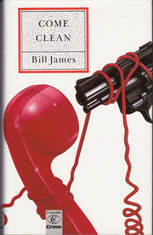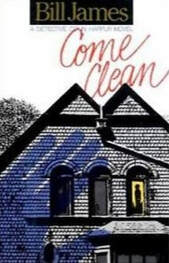
The organized criminal element in James’ unnamed city has been reduced to two rival gangs: Leo Tacette and his sons, and Benny Loxton and his faithful henchmen. (The personalities and fates of the other urban kingpins are vividly presented in the two prior entries, Halo Parade and Protection.) At start, Harpur and his supervisor, Assistant Chief Constable Desmond Iles, know that something dark is in the works, but are short on details. There are rumors that Loxton’s men may have silenced a potential informant in The Monty, Panicking Ralph’s pub. Among the customers in the wrong place at an inconvenient time are Sarah Iles, the ACC’s wife, and Ian Aston, her lover. Their bond is another pairing of law-abider and lawbreaker, both finding a thrill in their illicit and dangerous union. Benny Loxton learns of the witnesses and needs to take care of the situation, but must tread lightly to keep his plans moving forward.
Bill James is a master of complicating the picture and exploring the nuanced permutations as powers shift and alliances change within the cast of his two crime-propelled worlds. There is a fair amount of empathy generated for the status-seeking criminal leads, even as they plot violence and put the lives of others at risk. One reason is that, at least so far, all of the crooks James has chosen to spotlight are upwardly mobile at heart: they want the upper-class amenities, but most of all they want to be socially respected. The money may be dirty, but it still buys the expensive house in the suburbs. Here, Loxton’s wife ensures that they are seen in the right circles, attending charity functions and donating handsomely to feed the unfortunate in Africa. The irony is that the quest for respectability isn’t out of reach; in America, at any rate, once one achieves a certain income bracket, few people will question where the money came from or just how many people were abused and discarded in its collection. Being rich is justification enough.

It is also the first book that runs past the up-to-now concise length of 188 pages, and Come Clean’s pacing suffers slightly as a result. The dialogue exchanges and the sharply ruminative inner thoughts of the characters are as engaging as ever, but there are just too many of them, and a few scenes could have been summarized or omitted without losing any resonance, while also giving the story a sleeker trajectory. The novel is still highly readable, with a wonderful late-chapter climax that feels bracing and inevitable; the book just runs about 70 pages longer than necessary. And when an author delivers four slim and lean-muscled books in a series, a fifth, flabbier one that meanders more than the others is more noticeable in contrast.
But let me return to that amazing, amusing pas de deux between man and woman, cop and criminal, husband and wife, that Bill James orchestrates and explores in such fascinating detail. As an example, I share two paragraphs to provide Megan Harpur’s perspective. Harpur’s wife has very little stage time in Come Clean, but she too has analyzed her husband and has learned the dance:
Megan believed detective work should be like in the Sherlock Holmes pieces, all magnifying glasses and clever deductions from train timetables. And she believed, too, that there should be a great and obvious gulf fixed between what was legal and what was not.
So, she loathed the way Harpur worked, and referred to him occasionally as the sardonic rat of no-man’s land, apparently after some war poem she knew: almost everything could be reduced to literature if you had the reading. What she meant was that, to do his job, he lived and thrived in an undefined, dirty and perilous area between villainy and rectitude, constantly blurring the line separating what was right from what was necessary.
 RSS Feed
RSS Feed